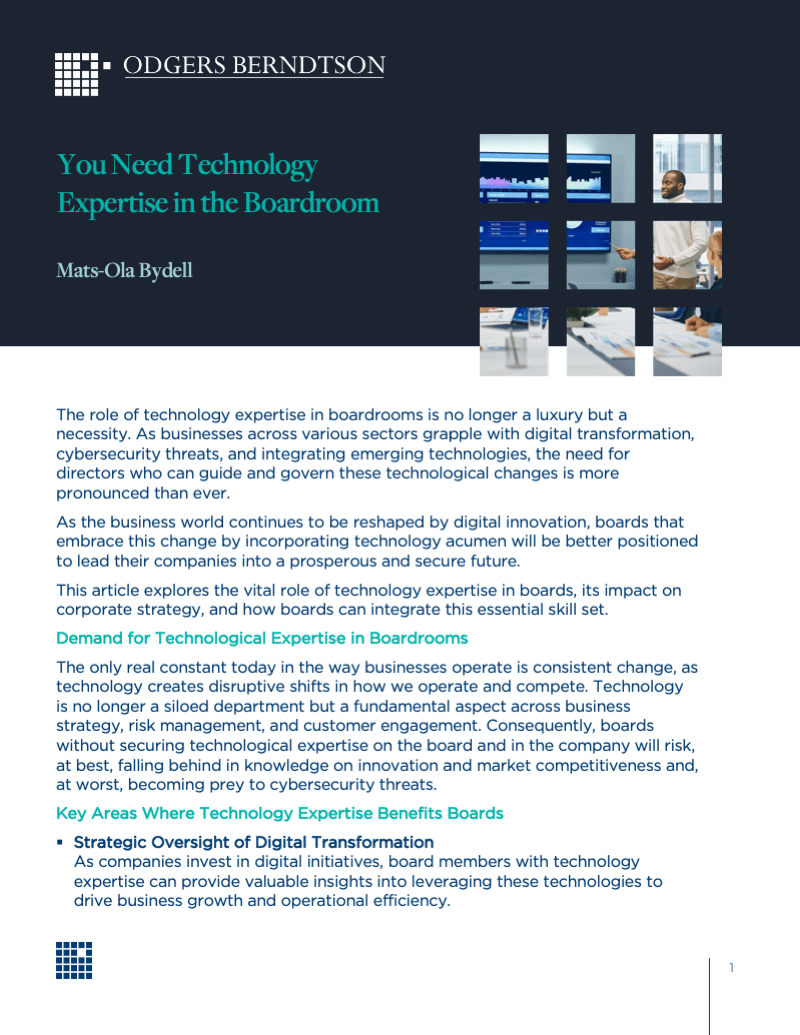The role of technology expertise in boardrooms is no longer a luxury but a necessity. As businesses across various sectors grapple with digital transformation, cybersecurity threats, and integrating emerging technologies, the need for directors who can guide and govern these technological changes is more pronounced than ever.
As the business world continues to be reshaped by digital innovation, boards that embrace this change by incorporating technology acumen will be better positioned to lead their companies into a prosperous and secure future.
This article explores the vital role of technology expertise in boards, its impact on corporate strategy, and how boards can integrate this essential skill set.
Demand for Technological Expertise in Boardrooms
The only real constant today in the way businesses operate is consistent change, as technology creates disruptive shifts in how we operate and compete. Technology is no longer a siloed department but a fundamental aspect across business strategy, risk management, and customer engagement. Consequently, boards without securing technological expertise on the board and in the company will risk, at best, falling behind in knowledge on innovation and market competitiveness and, at worst, becoming prey to cybersecurity threats.
Key Areas Where Technology Expertise Benefits Boards
- Strategic Oversight of Digital Transformation
As companies invest in digital initiatives, board members with technology expertise can provide valuable insights into leveraging these technologies to drive business growth and operational efficiency. - Cybersecurity Governance
With cyber threats posing significant risks to businesses, directors with a deep understanding of cybersecurity can help establish robust governance frameworks to protect company assets and reputation. Approximately 54% of respondents in a survey by the Society of Corporate Governance stated that cybersecurity skills and experience are taken into consideration when recruiting new directors. - Data Governance and Ethics
In an era where data is a critical asset, technology-savvy board members play an essential role in overseeing data management strategies and ensuring ethical use of data. - Innovation and Competitive Advantage
Directors with a tech background can identify emerging technological trends and innovations that can provide a competitive edge or disrupt the industry.
Bridging the Technology Expertise Gap in Boardrooms
As many boards have been traditionally composed of seasoned CEOs, bringing technological expertise and acumen into the boardroom often requires searching outside of known networks and board feeder positions.
As you look to build tech experience and expertise into your board makeup, there are several strategies that can help:
-
Recruiting Tech-Savvy Directors
Boards should proactively seek candidates with strong backgrounds in technology. This could include executives from tech companies, entrepreneurs in the digital space, or experts in digital transformation. -
Continuous Learning and Development
Boards can organize workshops and learning sessions to keep all members abreast of key technology trends and issues that impact the business. -
Leveraging External Expertise
Engaging with technology consultants, executive recruiting firms, or advisory firms can supplement the board’s expertise and provide fresh perspectives or candidates. A survey on Board Refreshment Data from the Society of Corporate Governance found that 80% of respondents in Europe and 66% in North America use executive search firms to identify potential director candidates with technology expertise. -
Creating a Technology Committee
Some boards may benefit from establishing a dedicated technology committee to focus on tech-related strategies and issues, similar to audit or compensation committees.
Challenges and Considerations
While the integration of technology expertise is crucial, it comes with challenges:
- Balancing Tech Expertise with Other Skills
Boards must ensure that the addition of technology experts does not overshadow other vital skills such as financial acumen or industry knowledge. - Avoiding Jargon and Fostering Clear Communication
This is especially important as today’s boards are under heavy scrutiny and are accountable for increased transparency and stakeholder communication. Tech-savvy directors should be able to communicate complex tech concepts in a manner that other board members can understand and relate to the broader business strategy. - Staying Current
The fast-paced nature of technology means that continuous learning and adaptation are necessary. This is true even for those who come from a technical background.
The Future of Technology in Boardrooms
As we look to the future, the role of technology in boardrooms is set to become even more integral. Boards will need to stay ahead of the curve in areas like AI, the Internet of Things, and blockchain. The successful boards will be those that not only embrace technology expertise but also integrate it seamlessly into their overall governance and strategic framework.
Incorporating tech expertise amidst the ongoing change of our world and marketplaces can feel daunting, but the upsides are well worth it. Many of our clients have successfully integrated technology expertise into their boards, leading to enhanced innovation, better risk management, and improved strategic decision-making. We have seen these same companies leverage new technology to enter new markets, improve customer experiences, or create more efficient operational models.
Are you ready to attract directors with crucial skill sets in areas like advanced technology? Odgers Berndtson advises some of the world’s largest corporations in this area, and we hope you’ll reach out.




